See the lion, save the lion
As the world prepares for Disney’s highly-anticipated, live-action remake of The Lion King, I can’t help but reflect on Africa’s most iconic species. The king of the jungle’s reign comes under greater threat with each passing year, yet this sad fact remains relatively overlooked. Just several decades ago, 450,000 lion ruled Africa’s savannahs; now the number has dwindled to 20,000.
 Thankfully, vital conservation work on private reserves has greatly improved the protection of the lion. By choosing to take a safari at a camp on these conservancies, often in blissful privacy and comfort, you are contributing to the ongoing survival of these majestic cats and many other endangered animals.
Thankfully, vital conservation work on private reserves has greatly improved the protection of the lion. By choosing to take a safari at a camp on these conservancies, often in blissful privacy and comfort, you are contributing to the ongoing survival of these majestic cats and many other endangered animals.
 Great Plains Conservation owns a number of camps on private reserves across Africa and has founded a project specifically aimed at lion conservation. Land for Lions, along with its annual cycling safari component, Ride for Lions, is a programme that raises funds to save these felines. It has seen lion re-establishment in Zimbabwe, an expanded lion corridor in Kenya, and the prevention of human-wildlife conflict in Botswana. I have stayed in all three of these countries and can highly recommend the sumptuous Great Plains camps, such as Mpala Jena, Mara Plains and Zarafa.
Great Plains Conservation owns a number of camps on private reserves across Africa and has founded a project specifically aimed at lion conservation. Land for Lions, along with its annual cycling safari component, Ride for Lions, is a programme that raises funds to save these felines. It has seen lion re-establishment in Zimbabwe, an expanded lion corridor in Kenya, and the prevention of human-wildlife conflict in Botswana. I have stayed in all three of these countries and can highly recommend the sumptuous Great Plains camps, such as Mpala Jena, Mara Plains and Zarafa.
 Other destinations where you are likely to see Africa’s largest cat are Tanzania’s vast Serengeti and remote Ruaha National Park. The former is a thrilling location for watching lion, leopard and cheetah hunt among the millions of wildebeest undertaking the Great Migration. Ruaha is Tanzania’s largest national park, with diverse landscapes comprised of wetlands, river networks and mountains, creating a haven not only for cats, but also huge elephant herds and myriad plains game. In southern Africa, are the black-maned lion of the Kalahari, the stunning white lion of South Africa, and the desert-adapted lion living in Namibia’s arid dunescapes.
Other destinations where you are likely to see Africa’s largest cat are Tanzania’s vast Serengeti and remote Ruaha National Park. The former is a thrilling location for watching lion, leopard and cheetah hunt among the millions of wildebeest undertaking the Great Migration. Ruaha is Tanzania’s largest national park, with diverse landscapes comprised of wetlands, river networks and mountains, creating a haven not only for cats, but also huge elephant herds and myriad plains game. In southern Africa, are the black-maned lion of the Kalahari, the stunning white lion of South Africa, and the desert-adapted lion living in Namibia’s arid dunescapes.
 Whether it’s inspired by countless hours re-watching the Disney classic with children or by a life-long love of cats, a trip to see Simba and Nala roaming freely on vast expanses of protected land deserves a place on every bucket list.
Whether it’s inspired by countless hours re-watching the Disney classic with children or by a life-long love of cats, a trip to see Simba and Nala roaming freely on vast expanses of protected land deserves a place on every bucket list.
 Laura Burdett-Munns is Managing Director at Africa Exclusive. Africa Exclusive has been creating the finest tailor-made safaris since 1990, specialising in luxurious accommodation in beautiful remote places.
If you would like to be a guest blogger on A Luxury Travel Blog in order to raise your profile, please contact us.
Laura Burdett-Munns is Managing Director at Africa Exclusive. Africa Exclusive has been creating the finest tailor-made safaris since 1990, specialising in luxurious accommodation in beautiful remote places.
If you would like to be a guest blogger on A Luxury Travel Blog in order to raise your profile, please contact us.
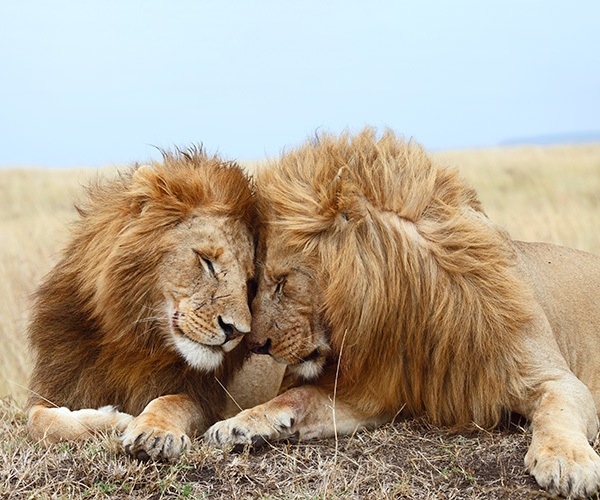 Thankfully, vital conservation work on private reserves has greatly improved the protection of the lion. By choosing to take a safari at a camp on these conservancies, often in blissful privacy and comfort, you are contributing to the ongoing survival of these majestic cats and many other endangered animals.
Thankfully, vital conservation work on private reserves has greatly improved the protection of the lion. By choosing to take a safari at a camp on these conservancies, often in blissful privacy and comfort, you are contributing to the ongoing survival of these majestic cats and many other endangered animals.
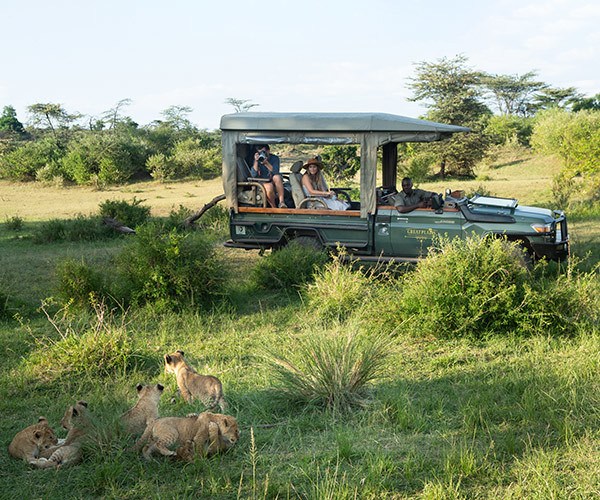 Great Plains Conservation owns a number of camps on private reserves across Africa and has founded a project specifically aimed at lion conservation. Land for Lions, along with its annual cycling safari component, Ride for Lions, is a programme that raises funds to save these felines. It has seen lion re-establishment in Zimbabwe, an expanded lion corridor in Kenya, and the prevention of human-wildlife conflict in Botswana. I have stayed in all three of these countries and can highly recommend the sumptuous Great Plains camps, such as Mpala Jena, Mara Plains and Zarafa.
Great Plains Conservation owns a number of camps on private reserves across Africa and has founded a project specifically aimed at lion conservation. Land for Lions, along with its annual cycling safari component, Ride for Lions, is a programme that raises funds to save these felines. It has seen lion re-establishment in Zimbabwe, an expanded lion corridor in Kenya, and the prevention of human-wildlife conflict in Botswana. I have stayed in all three of these countries and can highly recommend the sumptuous Great Plains camps, such as Mpala Jena, Mara Plains and Zarafa.
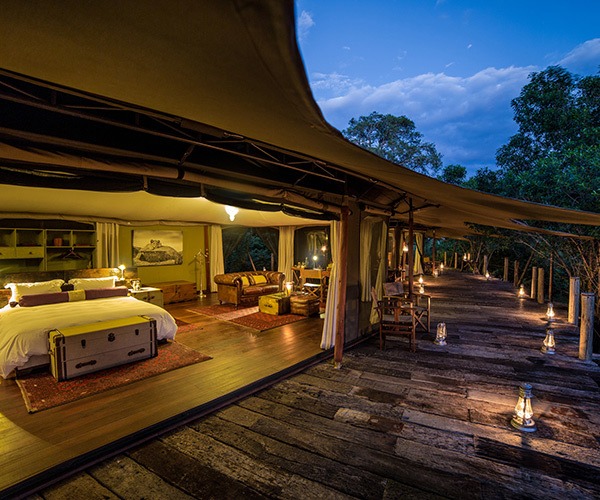 Other destinations where you are likely to see Africa’s largest cat are Tanzania’s vast Serengeti and remote Ruaha National Park. The former is a thrilling location for watching lion, leopard and cheetah hunt among the millions of wildebeest undertaking the Great Migration. Ruaha is Tanzania’s largest national park, with diverse landscapes comprised of wetlands, river networks and mountains, creating a haven not only for cats, but also huge elephant herds and myriad plains game. In southern Africa, are the black-maned lion of the Kalahari, the stunning white lion of South Africa, and the desert-adapted lion living in Namibia’s arid dunescapes.
Other destinations where you are likely to see Africa’s largest cat are Tanzania’s vast Serengeti and remote Ruaha National Park. The former is a thrilling location for watching lion, leopard and cheetah hunt among the millions of wildebeest undertaking the Great Migration. Ruaha is Tanzania’s largest national park, with diverse landscapes comprised of wetlands, river networks and mountains, creating a haven not only for cats, but also huge elephant herds and myriad plains game. In southern Africa, are the black-maned lion of the Kalahari, the stunning white lion of South Africa, and the desert-adapted lion living in Namibia’s arid dunescapes.
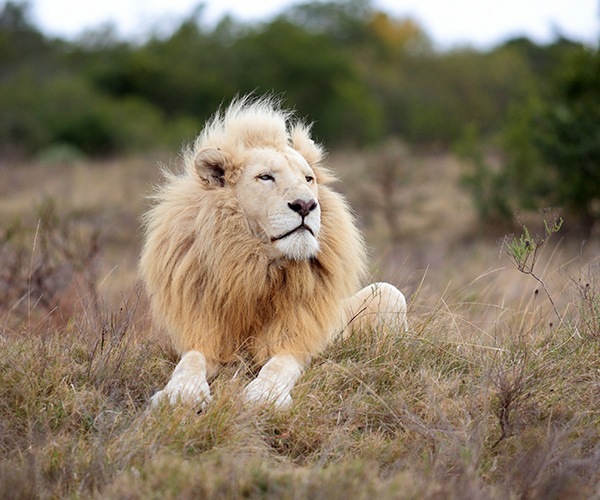 Whether it’s inspired by countless hours re-watching the Disney classic with children or by a life-long love of cats, a trip to see Simba and Nala roaming freely on vast expanses of protected land deserves a place on every bucket list.
Whether it’s inspired by countless hours re-watching the Disney classic with children or by a life-long love of cats, a trip to see Simba and Nala roaming freely on vast expanses of protected land deserves a place on every bucket list.
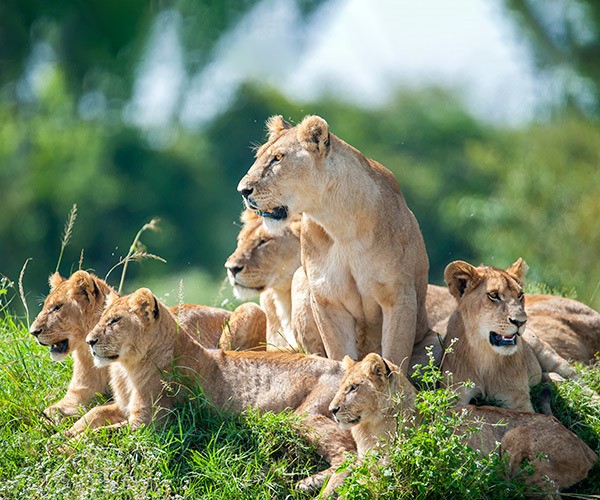 Laura Burdett-Munns is Managing Director at Africa Exclusive. Africa Exclusive has been creating the finest tailor-made safaris since 1990, specialising in luxurious accommodation in beautiful remote places.
If you would like to be a guest blogger on A Luxury Travel Blog in order to raise your profile, please contact us.
Laura Burdett-Munns is Managing Director at Africa Exclusive. Africa Exclusive has been creating the finest tailor-made safaris since 1990, specialising in luxurious accommodation in beautiful remote places.
If you would like to be a guest blogger on A Luxury Travel Blog in order to raise your profile, please contact us.Did you enjoy this article?
Receive similar content direct to your inbox.


A fall in the lion population, in Africa, from 450,000 to 20,000 is worrying enough. Was the figure even higher than that? Has anybody ever tried to calculate what the number was back in say 1600 before the invasion of the colonials began?
It is a win:win situation when you stay on a game reserve that is playing its part in the battle to save the lion. Though it worries me that beyond the game reserve man still continues to encroach on the lion’s territories. I think there is still so much more that we could do to take action to get numbers to increase. There must be a role here for the United Nations to use the world’s funds to purchase land and manage additional reserves. The UN could also play a role in creating much needed employment for many local people on these reserves too.
I know that Disney and the other film makers come in for a lot of criticism over the anthropomorphic nature of their characters. I know where the critics are coming from when they say it is wrong to give lions and other creatures human characteristics. But if in doing say they make the next generation a little more sympathetic towards lions, then in my book that anthropomorphism can only be a good thing.
It is a bit of an aside but my favourite character in the original Lion King was Scar. He was just so Mephistopheles, so cunning, so duplicitous. He is a great antidote to the usual cuddly, furry side of anthropomorphism.
Great and important piece if we are going to take conservation seriously.
On a lighter note, I just wonder how politically correct lions are! Last year I saw a lion and a lioness breakfasting on their kill of a bok in South Africa. The Male was incredibly chauvinist, clearly taking the best chunks of meat for himself and cuffing the lioness round the War whenever she got too close to his breakfast. His behaviour didn’t impress the ladies in our party.
Hunting, poaching and habitat loss are some of the reasons why the number of lions in the wild is declining. According to research, as of 2018, around 14,000 lions are to be found in South Africa. It is good to know that there are a lot of people who devote their time to raise awareness in causes like this. Aside from that, there is also a need for us to educate ourselves and others as well on problems that concern the environment so that we may be able to act collectively. This is not just for our own good but also for the future generations.